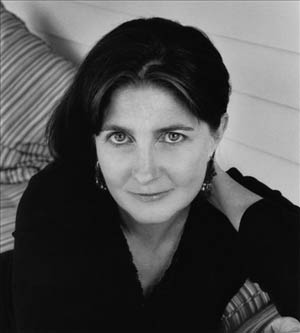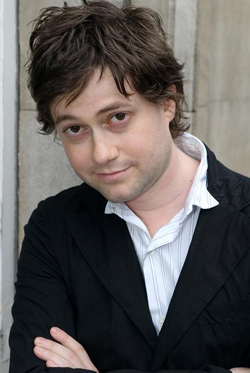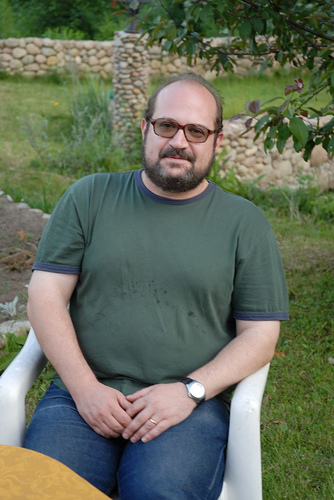Robin Black appeared on The Bat Segundo Show #333. Ms. Black is most recently the author of If I Loved You, I Would Tell You This.
Listen: Play in new window | Download
Condition of Mr. Segundo: If he could tell you, he’d have to love you.
Author: Robin Black
Subjects Discussed: Writing ten stories over eight years, rumination time and writing, Black discarding 75% of what she writes, the importance of being surprised while writing, writing while doing the dishes, avoiding explicit metaphor, the scarf in “Tableau Vivant,” how a real-life neighbor’s fence became a fictional neighbor’s fence, feeling exposed through stories vs. the control of memoir, Veterans Day transformed into Resolution Day, perceived strangeness in reality, negotiating the gray area between two extremes, the tension between how people perceive their lives are vs. what their lives really are, the clinical approach to birth and death, being careful about deploying sentiment, observing limitless forms of human behavior and trying to corral it into the neatness of narrative, seeing more gestures and facts about people being more relevant, a character’s relationship with another person’s face, early problems with human gesture, being conscious of the symbolic scheme within a story, sex that isn’t explicitly stated within the stories, the words “sexual encounter,” cybersex, carnal reticence, the defamiliarization of the familiar, a disproportionate focus on the physical act, car crashes and accidents used to galvanize the characters, stories anchored by older women, older women as an increasingly invisible presence in society, the fictional potential in leading an undercover life, explicit communicative disconnect in “Immortalizing John Parker,” characters who resist what the author is trying to get them to do, crutch words from characters, the phrase “So what,” revealing the surname of a character slightly later than expected after the initial introduction, learning from Virginia Woolf’s Mrs. Dalloway, first person vs. third person, twos and threes within the stories, avoiding the usual lists of threes, and playing with fairy tale images.
EXCERPT FROM SHOW:
Black: I also wrote a lot of bad stories. I went into writing ten that I thought were decent enough.
Correspondent: How many bad stories?
Black: I think that if you count just the ones I completed, there are probably twenty-five others. And if you count the others that I started, and got anywhere from two to twenty pages into, there are probably another two dozen of those. So a lot. I produce a lot of pages. I like a very low percentage of them.
Correspondent: This is interesting that you do all of your thinking at the keyboard. Because the character relationships in many of these stories are quite intricate and quite connected. Do you figure out these relationships over the course of writing? How does this work exactly? Expand upon the rumination.
Black: Where does it all come from? None of it’s autobiographical. I always have to start there. So I’m not one of these people who thinks, “Wow! This thing that just happened to me would make a great story.” And to the extent that I ever think that, I put that into memoir. So if I write about myself, then I’m really writing about myself. These things are all made up. I said that a lot of it happens at the keyboard. But I should more accurately say that I also do a lot of my writing while I’m doing the dishes. Though my husband may laugh at the idea that I ever do the dishes. While I’m walking. I’m not somebody who thinks that everyone needs a regiment of sitting down and writing. A certain amount of time. Because a lot of my writing happens away. I’ll just be thinking about the people in the stories. Really as though they were friends of mine, and I was trying to figure out just what the heck they would do with their lives. And so it’s a lot of just thinking through human psychology that goes into it.
Correspondent: You mention not wanting to lift from reality. And this is interesting to me. Because I noted that in these stories, you really go out of your way to avoid extremely explicit metaphors, save in two stories. In “Tableau Vivant,” you of course have the scarf. And “If I Loved You” has the fence. I’m wondering if the scarf and the fence came about as a way of knowing the characters. Or a way of moving the characters on the chessboard while you were doing the dishes. What happened here?
Black: The scarf in “Tableau Vivant” is complete invention. The fence is not. We actually have a neighbor who built a fence in our driveway. And in pondering how to write about it — because it was one of those events that struck me as so peculiar. That somebody would just move into a neighborhood and start tromping on their neighbors. It seemed like such an odd character defect, I guess, in a human being. I thought, “Well, I’ll write an essay about it.” What’s it like to have a horrible human being move in next to you. And then I thought, “Well, I don’t really want to write an essay about it. I’ll write a story about it.” But, again, I don’t write about myself. So the only thing in there that’s true is that there was a fence. And the other piece of truth was my impulse in the story to say to this man, “How can you just be this mean to people when you have no idea what the meaning of this is to them?” And there’s actually a funny story about that. When that story was published in the Southern Review — and in the story, the woman whose fence it is, is dying a very sad, terrible death; and when Bret Lott, who was then editing the Review called me up to say they had taken it — I was all excited. And I said — the first words out of my mouth were “Oh, I can’t wait to throw a copy of it over that damn fence.” And there was this terrible pause. And I realized that he was trying to figure out how much of it was true. And I said, “Oh! I’m not dying. There just is a fence.” So often my stories will have tiny real elements among them, and I’ll kind of build a universe around that.
The Bat Segundo Show #333: Robin Black (Download MP3)



 Lee: I’ve always been very conscious of language. It might seem silly of me to say, given all of the things that have happened in my books. I’m not terribly interested in plot. (laughs) I mean, I enjoy it. But I find, for me, the real action in drama is in the play of the sentences and in the play of the words. That’s what draws me through the story too. I mean, in some ways, unless I hear the sentence, I don’t understand what it really means. And even back in school, when I was writing a lot more essays, I would always try to craft it so that it felt like something and it sounded like something to me, rather than just said something. And particularly vis-à-vis the scenes of violence, I wanted — I think in this book and in A Gesture Life — I tried to think to myself, “What was the most, in some ways, unlikely way to describe this?” With perhaps spare and beautiful language that would add a layer of a different kind of horror to the moment. Just the contrast between how not lovely, but how handsome everything seemed and normal, given what was happening.
Lee: I’ve always been very conscious of language. It might seem silly of me to say, given all of the things that have happened in my books. I’m not terribly interested in plot. (laughs) I mean, I enjoy it. But I find, for me, the real action in drama is in the play of the sentences and in the play of the words. That’s what draws me through the story too. I mean, in some ways, unless I hear the sentence, I don’t understand what it really means. And even back in school, when I was writing a lot more essays, I would always try to craft it so that it felt like something and it sounded like something to me, rather than just said something. And particularly vis-à-vis the scenes of violence, I wanted — I think in this book and in A Gesture Life — I tried to think to myself, “What was the most, in some ways, unlikely way to describe this?” With perhaps spare and beautiful language that would add a layer of a different kind of horror to the moment. Just the contrast between how not lovely, but how handsome everything seemed and normal, given what was happening.
 Correspondent: I wanted to ask you about your sentences. You do something extremely interesting, and this syllabic form of internal rhyme. I’ll just give you a number of examples: “a tawny teen in a cocktail dress of skimpy hemp.” “I started to rub myself and, remembering I would have to retrieve Bernie soon, recalled that I’d once done what I was doing with Bernie in the room.” So there’s the oo, oo. The book’s opening line, of course: “Horace, the office temp, was a run-down and demented pimp.” So I’m curious whether these particular sounds serve as, I suppose, reference points in your mind to get a sentence right, whether this came from your previous career as a lyricist or possibly the Gordon Lish school rubbing off now after so many books and the like.
Correspondent: I wanted to ask you about your sentences. You do something extremely interesting, and this syllabic form of internal rhyme. I’ll just give you a number of examples: “a tawny teen in a cocktail dress of skimpy hemp.” “I started to rub myself and, remembering I would have to retrieve Bernie soon, recalled that I’d once done what I was doing with Bernie in the room.” So there’s the oo, oo. The book’s opening line, of course: “Horace, the office temp, was a run-down and demented pimp.” So I’m curious whether these particular sounds serve as, I suppose, reference points in your mind to get a sentence right, whether this came from your previous career as a lyricist or possibly the Gordon Lish school rubbing off now after so many books and the like.
 Johnson: The Internet is in the library. Google is in the library. The librarians know how to use that. So you go to those public computers in the library. You have a librarian who can not only do Google, but who can also tell you, point you to any number of other resources that are not included in Google, or that are very difficult to get to through Google. It seems like Google is so simple. “It’s so simple even your grandmother can use it,” is the way it was described to me. Yeah, it’s brilliant for getting the quick hit on the restaurant in the Village that you want to have dinner at. There’s the address. There’s the phone number. There’s the little Google map that will get you there. But when you are actually trying to track back. When I have a clipping of a newspaper, and I’m trying to find the digital version of that, I get lost sometimes. It can’t find it. The bread crumbs don’t take you to where you know it has to be. And I’ve had librarians who have actually shown me how to wend my way through Google, which is, after all, full of redundancies, not weighted in terms of date. You need to put your heavy boots on to wade through it sometimes.
Johnson: The Internet is in the library. Google is in the library. The librarians know how to use that. So you go to those public computers in the library. You have a librarian who can not only do Google, but who can also tell you, point you to any number of other resources that are not included in Google, or that are very difficult to get to through Google. It seems like Google is so simple. “It’s so simple even your grandmother can use it,” is the way it was described to me. Yeah, it’s brilliant for getting the quick hit on the restaurant in the Village that you want to have dinner at. There’s the address. There’s the phone number. There’s the little Google map that will get you there. But when you are actually trying to track back. When I have a clipping of a newspaper, and I’m trying to find the digital version of that, I get lost sometimes. It can’t find it. The bread crumbs don’t take you to where you know it has to be. And I’ve had librarians who have actually shown me how to wend my way through Google, which is, after all, full of redundancies, not weighted in terms of date. You need to put your heavy boots on to wade through it sometimes.